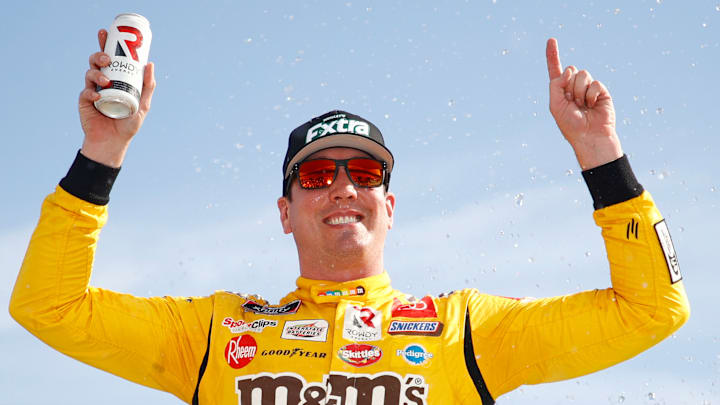For years, Kyle Busch was running in as many NASCAR Xfinity Series and Truck Series races as he possibly could, even during his time as an experienced full-time Cup Series driver. In fact, in 2009, when he won four Cup races, he won the Xfinity Series championship with a nine-win season. He was a "series regular", because he was allowed to be.
But NASCAR started to enforce stricter limits on full-time Cup Series drivers with five or more years of Cup Series experience over the years in the two lower national series.
In 2017, the limit was 10 Xfinity Series races and seven Truck Series races for those drivers. In 2018, the limit was seven Xfinity Series races and five Truck Series races. These limits remained in place for 2019.
Then in 2020, the limit was five Xfinity Series races and five Truck Series races, and it was enforced for full-time Cup drivers with just three or more years of Cup Series experience, rather than five. Those limits have been in place ever since.
Even as the limits became stricter and stricter, fans still didn't like Busch running in (and winning in) those two series.
NASCAR has changed those rules for 2026
With Busch being the only driver competing in the maximum number of allowable races each year when these restrictions were in place, these limitations became known as the "Kyle Busch rule", in some respect.
Busch, the all-time winningest driver in both the Xfinity Series and the Truck Series, has continued to run five Truck Series races per year each year since 2018, even after selling his Kyle Busch Motorsports team to Spire Motorsports after the 2023 season, and he has found victory lane at least once each year going back to 2013.
The two-time Cup Series champion did say he'd stop competing in the Xfinity Series once he reached 100 career wins. After going five-for-five in 2021, he hit 102 wins, and he indeed sat out the 2022 season. He only returned in 2023 for four races after switching Cup teams and manufacturers, and he only ran one race in 2024. He did not compete at all in 2025.
Now NASCAR is set to loosen their restrictions on full-time Cup drivers running in the lower national series.
Beginning in 2026, full-time Cup Series drivers with at least three years of experience are set to be allowed to compete in as many as 10 Xfinity (O'Reilly Auto Parts) Series races and eight Truck Series races. They will continue to be ineligible to run the regular season finale, playoff races, and the championship race.
Because Busch was the only one doing it to begin with, and we haven't seen anybody consistently taking advantage of these limits ever since he stopped competing in the Xfinity Series, do we really expect Cup Series drivers to suddenly start taking advantage of an even looser limit by running 18 total races in these two series?
In 2025, Ross Chastain was the only full-time Cup Series driver who ran five Xfinity Series races, and he was the only full-time Cup Series driver who ran five Truck Series races. It was the first time he took advantage of both limits in the same year, and nobody else took advantage of either.
In fact, no one else has taken advantage of the Xfinity Series limit since A.J. Allmendinger ran five races in 2023.
If this change of heart from NASCAR doesn't make it obvious, I don't know what would; it's clear that the limits existed primarily, if not only, because of Busch.
And now that Busch no longer owns a Truck Series team and has competed in just one Xfinity Series race over the past two seasons combined, NASCAR can afford to loosen up on those restrictions.
I'm not here to say it's right or wrong; this is one of those cases where the rules are indeed the same for everybody who fits under that umbrella of Cup Series experience.
But the motive here is indisputable. NASCAR obviously doesn't mind the concept of having Cup drivers racing in lower series events, and in and of itself, they never did. But when it was Kyle Busch winning all the time, that, coupled with the fan backlash, became too much for them to handle.
